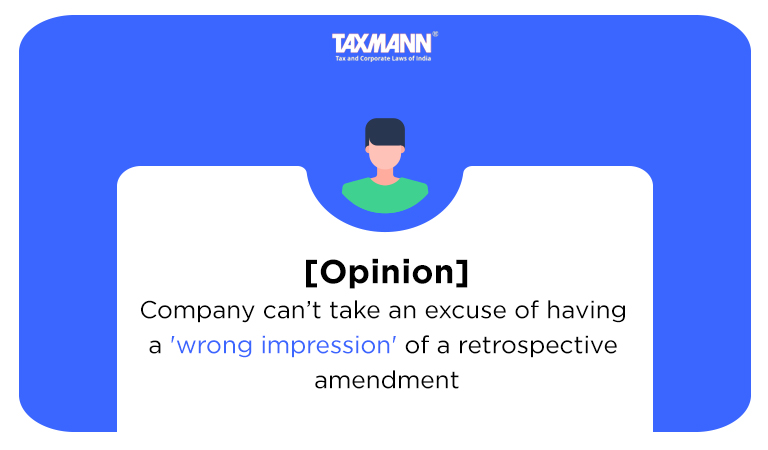[Opinion] Company can’t take an excuse of having a ‘wrong impression’ of a retrospective amendment
- Blog|News|Company Law|
- 3 Min Read
- By Taxmann
- |
- Last Updated on 9 January, 2023

[2023] 146 taxmann.com 118 (Article)
1. Introduction
Prospective means future laws, which means any law or regulation which were made in the purview of future acts. Retrospective means past laws, which means laws which followed under events that impaired an existing right or obligation. Whenever, the regulators bring out any amendments, which are always with prospective effect not with retrospective effect. Retrospective amendments of law or an ex post facto law are one that retroactively changes the legal consequences of actions that were committed, or relationships that existed, before the enactment of the law. For example, in the case of criminal law, the effect of retrospective might criminalize an action that was legal when the same was committed. Further, retrospective law-making is unjust because it disappoints the justified expectations of those who, in acting, have relied on the assumption that the legal consequences of their acts will be determined by the known state of the law established at the time of their acts. In this respect, vide Article 20(1) of our Constitution prohibits the enforcement of any retrospective law or amendment which might be harmful to the rights of the citizens and the amendments when brought out with prospective effect not at all harmful for the larger good.
2. Requirement of filing resolutions passed by the companies with the ROC
Sub-section (1) of section 117 of the Companies Act 2013, provides that a copy of every resolution or any agreement, in respect of matters specified in sub-section (3) of section 117 together with the explanatory statement under section 102, if any, annexed to the notice calling the meeting in which the resolution is proposed, shall be filed with the Registrar of Companies within thirty days of the passing or making thereof in such manner and with such fees as may be prescribed.
A copy of every resolution or any agreement required to be filed, together with an explanatory statement under section 102, if any, shall have to be filed with the Registrar of Companies in form no MGT-14 along with the fee. Sub-section (3) of section 117 provides the list of items for which such filing is called for and as per 117 (3) (g) resolutions passed pursuant to section (3) of section 179 is one such item against others. The above provisions were applicable to all the companies i.e. listed companies, unlisted public companies and as well to private companies – based on these provisions all companies were required to file the MGT-14 form for the resolutions passed as stated above.
3. Amendment brought out by MCA in respect of Private Limited Companies
The Ministry of Corporate Affairs, vide its notification dated 5th June 2015, declared that the provisions of section 117(3) (g) of the Companies Act 2013 shall not be applicable to Private Limited Companies effective from 5th June 2015 with a result the private companies were exempted from filing the form MGT-14 for the board resolutions passed by the companies. However, prior to this date, the private companies were also required to file form MGT-14 with the Registrar of Companies with respect to the resolutions required under Section 117(3) (g) of the Companies Act, 2013.
4. Penal provision for any default/violation under the Companies Act 2013
Sub-section (2) of section 117 of the Companies Act 2013 provides that if any company fails to file the resolution or the agreement under sub-section (1) before the expiry of the period specified therein, such company shall be liable to a penalty of one lakh rupees and in case of continuing failure, with a further penalty of five hundred rupees for each day after the first during which such failure continues, subject to a maximum of twenty-five lakh rupees and every officer of the company who is in default including liquidator of the company, if any, shall be liable to a penalty of fifty thousand rupees and in case of continuing failure, with a further penalty of five hundred rupees for each day after the first during which such failure continues, subject to a maximum of five lakh rupees.
Click Here To Read The Full Article
Disclaimer: The content/information published on the website is only for general information of the user and shall not be construed as legal advice. While the Taxmann has exercised reasonable efforts to ensure the veracity of information/content published, Taxmann shall be under no liability in any manner whatsoever for incorrect information, if any.

Taxmann Publications has a dedicated in-house Research & Editorial Team. This team consists of a team of Chartered Accountants, Company Secretaries, and Lawyers. This team works under the guidance and supervision of editor-in-chief Mr Rakesh Bhargava.
The Research and Editorial Team is responsible for developing reliable and accurate content for the readers. The team follows the six-sigma approach to achieve the benchmark of zero error in its publications and research platforms. The team ensures that the following publication guidelines are thoroughly followed while developing the content:
- The statutory material is obtained only from the authorized and reliable sources
- All the latest developments in the judicial and legislative fields are covered
- Prepare the analytical write-ups on current, controversial, and important issues to help the readers to understand the concept and its implications
- Every content published by Taxmann is complete, accurate and lucid
- All evidence-based statements are supported with proper reference to Section, Circular No., Notification No. or citations
- The golden rules of grammar, style and consistency are thoroughly followed
- Font and size that’s easy to read and remain consistent across all imprint and digital publications are applied



 CA | CS | CMA
CA | CS | CMA
